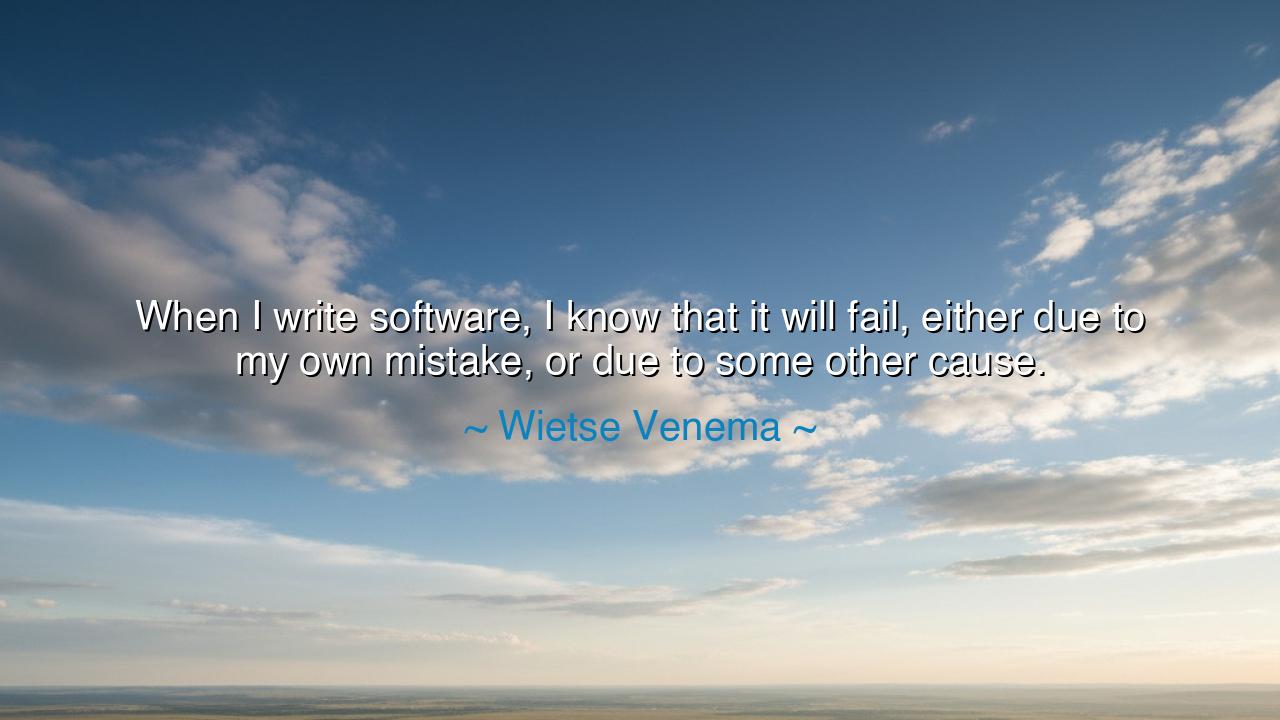
When I write software, I know that it will fail, either due to my
When I write software, I know that it will fail, either due to my own mistake, or due to some other cause.






In the vast journey of human endeavor, there is one truth that resonates through every field of creation: failure is inevitable. As Wietse Venema humbly acknowledges, "When I write software, I know that it will fail, either due to my own mistake, or due to some other cause." In these words, Venema speaks not of defeat, but of a profound understanding of the imperfection inherent in all human work. Whether in the creation of software, the construction of great works, or the pursuit of any noble endeavor, the certainty of failure is not a defeatist stance, but a recognition of the limitations of our abilities and the complexities of the world we navigate.
The ancient Greeks understood this truth well. The great philosopher Heraclitus once said, "Nothing endures but change," a reminder that all things are in a constant state of flux. The creation of any masterpiece, whether it be a physical structure or a mental construct, is subject to forces beyond our control. Art, engineering, and even human relationships are fraught with uncertainty, and to strive without acknowledging this uncertainty is to invite disappointment. Heraclitus’ words ring true in every craft: to attempt is to risk, and in that risk lies the essence of growth and progress.
Consider the story of Thomas Edison, whose relentless pursuit of invention was marked not by an unwavering certainty of success, but by a series of failures that spurred him toward innovation. Edison famously remarked, "I have not failed. I've just found 10,000 ways that won't work." His journey, much like Venema’s experience with software, was one of learning from failure, of confronting the truth that failure is not the opposite of success, but a necessary part of it. Edison's innovations were not born from perfection but from the resilience to continue after every setback, to accept failure as a companion on the road to discovery.
In the ancient world, Leonardo da Vinci too faced the inevitability of failure in his masterpieces. The great polymath, whose genius spanned art, science, and engineering, often encountered setbacks in his work. His attempts at engineering designs for flying machines, his inventions, and even some of his most ambitious paintings did not always meet his expectations. Yet, da Vinci's legacy endures not because he avoided failure, but because he embraced it as part of the creative process. His inventions were not realized in his lifetime, but they sowed the seeds of modern technology and innovation. Da Vinci understood, much like Venema, that failure was merely a signpost pointing toward future success.
The wisdom embedded in Venema’s words is a reminder to all who seek to create, whether in software development, art, or any other field, that failure is not something to fear, but to accept. It is not a sign of weakness, but of the vulnerability that comes with striving for something greater than ourselves. The philosophers of old taught that to truly live is to engage with the world openly, embracing both its joys and its challenges. Failure, in this sense, is an integral part of the human experience, a teacher that guides us toward mastery, humility, and deeper understanding.
In our modern world, where the pace of innovation is swift and the stakes often high, the fear of failure can paralyze even the most capable. Yet, the truth remains that perfection is a myth. To strive for excellence, as Venema does in his work with software, is to constantly acknowledge that setbacks and failures will come. The key is not to avoid them, but to learn from them, to adapt and improvise, and to keep moving forward. Just as Edison and da Vinci did, we must seek to find meaning in our mistakes and let them guide us toward our true potential.
The lesson here is one of acceptance and resilience. In any endeavor—be it in the building of software or the creation of art—we must accept that failure is not a mark of shame but a sign of our courage to take risks, to challenge the unknown, and to push the boundaries of what is possible. Venema teaches us that failure is not the end, but a necessary step in the journey of creation. Practical action calls upon us to embrace our failures with open arms, to reflect on what they teach us, and to persevere in the face of adversity, knowing that in each failure lies the potential for future success.
In the end, the greatest of creators—whether in the realm of technology, art, or science—are those who do not shy away from failure, but walk boldly into it, knowing that their path forward is shaped by the lessons learned in the wake of their mistakes. Let Venema’s words serve as a reminder that every failure brings us closer to understanding, and every misstep is but a step toward the brilliance we seek to create.






AAdministratorAdministrator
Welcome, honored guests. Please leave a comment, we will respond soon